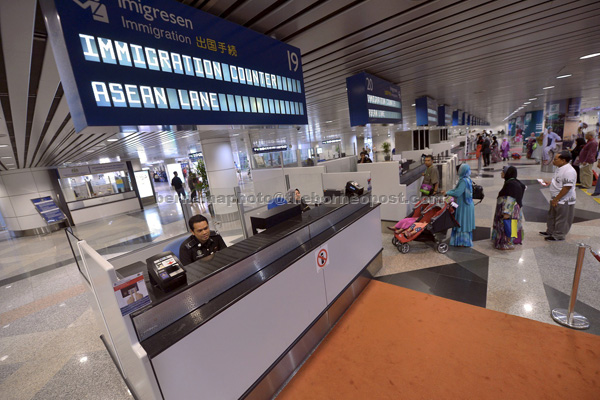
Datasonic Group Bhd has clarified that it is not the current principal supplier of the Malaysian passport booklets and chips to the Ministry of Home Affairs. — Bernama photo
KUALA LUMPUR: Datasonic Group Bhd has clarified that it is not the current principal supplier of the Malaysian passport booklets and chips to the Ministry of Home Affairs (MHA).
In a filing to Bursa Malaysia, the company said its unit, Datasonic Technologies Sdn Bhd (DTSB), did secure the work worth RM542.12 million for passport booklets and chips but the five-year contract starts from Dec 1, 2016.
“Percetakan Keselamatan Nasional Sdn Bhd, a company privatised by the Government-owned National Printing Department, has been given a six-month extension to supply two million passport booklets and chips from June 1, 2016 to Nov 30, 2016 by the Government,” it said.
This information was revealed by the company amid a news report stating that Datasonic is the principal supplier of the passports and many of the chips used on the data page allegedly had defects.
“Datasonic will be the new subcontractor to MHA for the supply of two million chips that will be embedded into the polycarbonate data pages,” it pointed out.
It said the first discussion on the terms and conditions and draft subcontractor agreement by MHA started on July 29, 2016.
“If everything goes smoothly, a subcontractor agreement between MHA and Datasonic for the supply of two million chips to PKN is expected to be signed and the necessary announcement will be made,” said Datasonic.
Explaining further, the main board-listed firm said during the period from April to July 2016, it delivered a total of 1,020,252 units of polycarbonate data pages to PKN comprising 121,000 thin polycarbonate data pages and 899,252 thick polycarbonate data pages with embedded chips.
The average delivery for the last four months from April to July 2016 was 255,063 units, it said.
“The actual migration to the new passport with embedded chips in the polycarbonate data pages started on May 16, 2016.
The utilisation of new polycarbonate data pages with embedded chips in May 2016 was less than 55,000 units,” said Datasonic.
In April 2016, it said, 223,000 units were delivered consisting of 119,000 units of thin polycarbonate data pages and 104,550 units of thick polycarbonate data pages with embedded chips.
In May 2016, it added, 149,662 units were delivered comprising 2,000 units of thin polycarbonate data pages and 147,662 units of thick polycarbonate data pages with embedded chips.
In June and July 2016, it noted, the number of polycarbonate data pages with chips delivered to MHA stood at 369,916 and 277,124 units respectively.
“The passing rate of the chip after 100 per cent quality control by Trub AG, Switzerland before shipment, 100 per cent incoming quality control by Datasonic and PKN is more than 99.76 per cent.
“Therefore, there is no issue on the quality of the chips,” it stressed.
As of June 24, 2016, out of the 523,940 units of the chips that had been delivered and verified by the main contractor before production, the rejection rate of the chips was very small at only 0.24 per cent, it said.
“There is no such thing as a large number of chips delivered to the main contractor had been rejected due to defects,” said Datasonic.
The new process of using e-Gate as shown in the notice at the e-Gate supplied and maintained by another vendor is to open the data page and put on top of the reader.
The new process of reading the passports as recommended by the International Civil Aviation Organisation (ICAO) is to enhance the security of border control and is accepted worldwide, it noted.
“All the new and old passport holders will not encounter any problem in using e-Gate as long as they follow the new process of reading to enhance the security of border control,” it added. — Bernama
